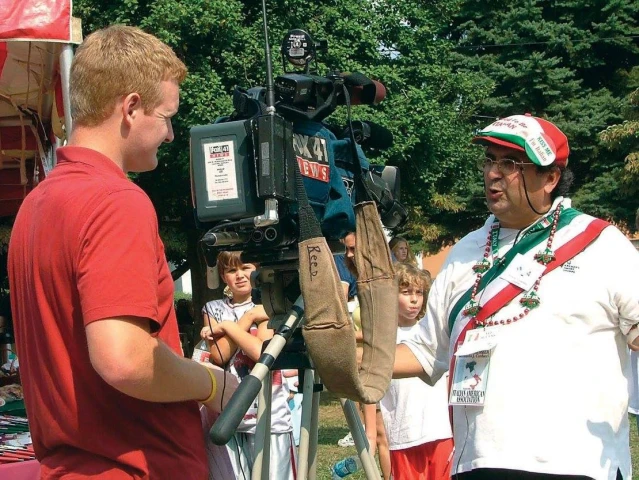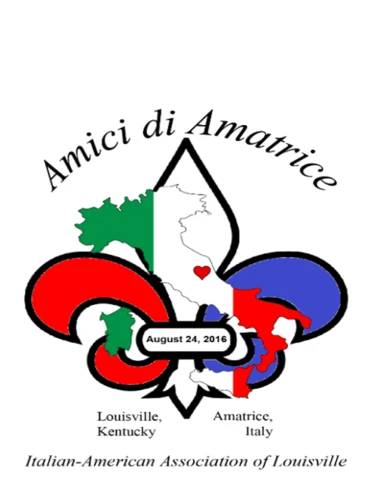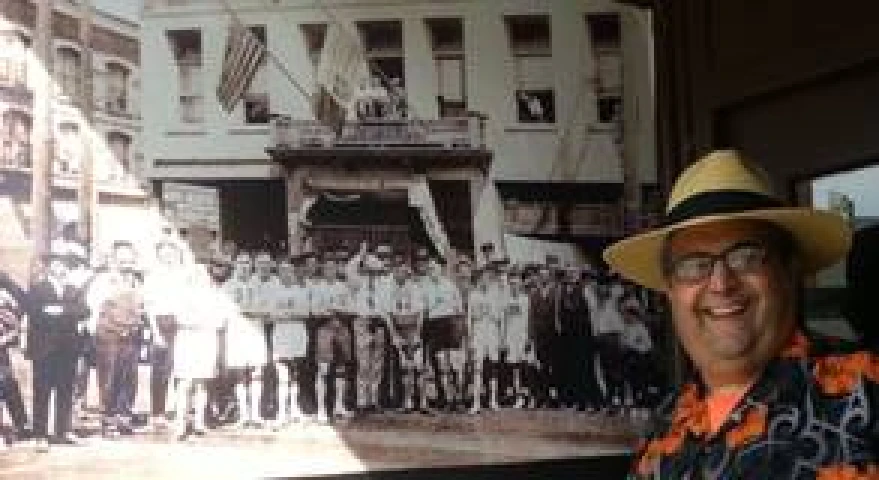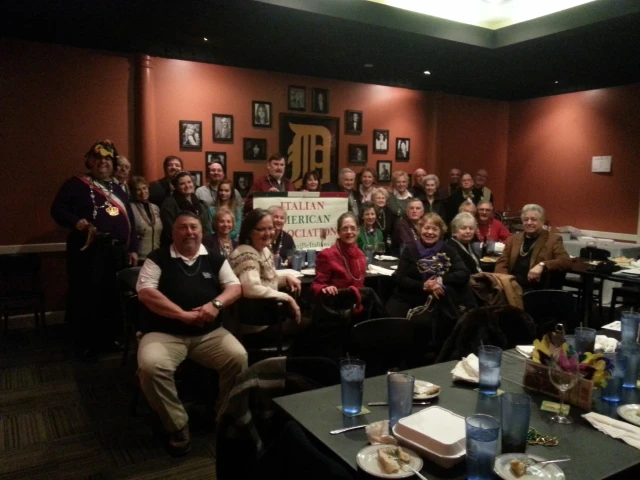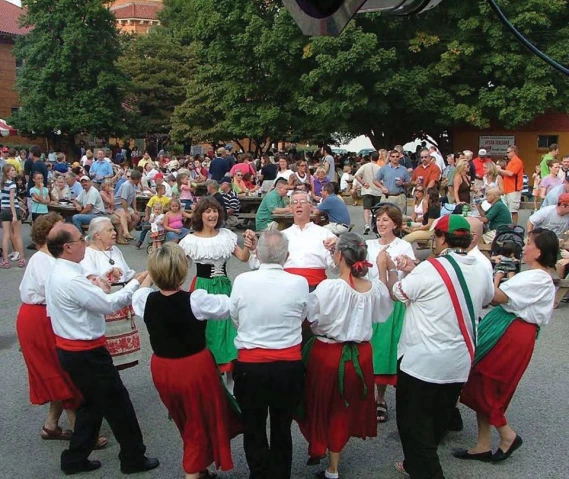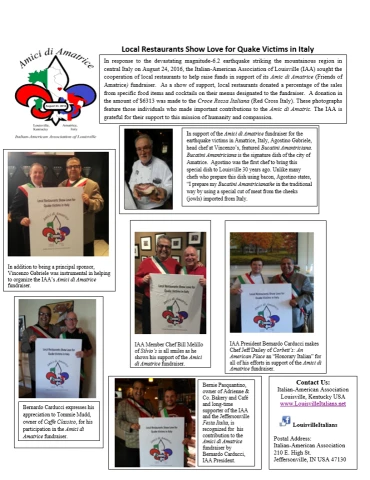Italy in Kentucky has a smaller history than other American places. The Bluegrass State saw some Italians come in the period of the mass emigration from Italy, but not as much as other bigger States on the two coasts.
Nonetheless, in Louisville there's a club that celebrates Italy in several different ways, led by a true Italian who is for sure the right person to talk about the past, present and future relationship between Italy and Kentucky. We are very glad to welcome Bernardo Carducci on We the Italians!
Bernardo, you are the President of the Italian-American Association (IAA) of Louisville, KY. Please tell us something about the story of your organization
Our organization, in many different reincarnations, has been around since the early 1900s.
They started an organization that was called "The Italian Club": that club, like so many other clubs was born thanks to the migration of the Italians, and was basically a religious and social organization, so that Italians coming from Italy had a social support network.
In the city of Louisville we never had many Italians, never more than approximately 1 % of the population, there wasn't a major migration like there was in some of the bigger eastern cities like New York, Boston or Philadelphia, but there was a small percentage. So that club lasted for about twenty years, it lasted about 1 generation, and then it faded away.
It typically happens, not just with Italians but with lots of other ethnic migrations: once people come and get settled, they no longer need the social support of other immigrants: they get assimilated into the community, they get jobs, they get welcomed, they move away from the city center into the suburbs.
Twenty years later, more or less in the 1940s, the Club was reignited again: what happened probably was that, ok, the people had moved away; but then they kind of missed a little bit being around other Italians. So they made another Social Club, this time more social, such as "let's get together, us being Italians": that lasted about another twenty years, another generation, and then again it faded away.
Our Club, the Italian-American Association of Louisville, it's the current incarnation that started in 1974, again about twenty years later, and I am very proud to say that we lasted more than twenty years! In fact, we are going on for more than 40 years now. Probably the strongest ethnic organizations are the newest: in Louisville there are people coming from Asian countries like Vietnam or Cambodia, but we try to keep our organization going on, although it's really, really hard!
I have been the President of this organization for almost 20 years, so I like to think I'm partly responsible for keeping that going in these years. But it's not because I do such a wonderful job: I think it's because it takes a lot of time, it takes a lot of effort and not everybody has that time, so I think I keep being reelected because no one else wants to do it! This is fine with me, as I enjoy very much serving the IAA. Members of the IAA have become my adopted family in this city. And of course, the Italian cultural is about family - La famiglia viene sempre per prima!
A criticism that people pose about our group here in Louisville is that we have very few people in our Italian American organization who actually speak Italian, and that's because their families didn't speak to them Italian or their families married outside of the Italian culture and so it wasn't spoke at home. I try to tell people that having a strong Italian American identity is not defined just by being able to speak Italian, it's defined by how you represent yourself, what you do and the support you provide with respect to your Italian heritage. So we try to do events that reflect our Italian heritage, although very few people speak Italian.
I speak very little Italian. Quick story: I have a very famous Italian name, Carducci, like the poet, everybody knows him. When I go to Italy and I check into hotels, and they want to see my passport, they see my name, they look at me, and then they look back to my passport and I know what they're going to ask me: "Are you related with Carducci the Poet?" And I have to tell them, "I'm not sure!" and I have to say that in English: and they are so disappointed that I have this famous and beautiful Italian name but I don't speak Italian! But my message is that it does not mean that I am not proud of my Italian heritage!
You don't have to be Italian to join our club, we have people who are Irish: to be a member of the Italian American Association, first and foremost you must love the things that are Italian, like fashion and food, but most importantly you have to love the people. That's what it takes to be a member of our club.
What are the activities of the Italian-American Association of Louisville?
We meet on a monthly basis and I like to tell people that the central theme of all our events basically is focused on the three F: Food, Fun and Family, the three things that everybody must have!
We try to bring people together around those things, so we do Italian theme different events: we have Italian dinners at various restaurants around town, as we don't have an Italian Club Home because we are not big enough. We also have Italian Movie theme nights, showing movies that have an Italian theme: the last movie we saw was "Bicycle thieves", a classic Italian Movie. We also celebrate Carnival: every February we dress up in carnival mask and celebrate Carnival, Italian style.
For many years we sponsored an Italian Festival in Louisville, and it was one of the most popular events to occur in the city, because everybody likes Italian food! The problem was, like everything else, it was hard to get people to volunteer: the club is getting smaller, the people are getting older, so it's really, really hard. The sponsor of the event was an Italian bakery and restaurant, but then they said that their business was growing, so they could not devote the time to the festival. We still get people who want to do this, so I am trying to work with the city government so that the city comes in and pays for the money. We want to revive it because everywhere I go people ask me "Why don't you have the Festival, when are we going to have the Festival back?"
This event was a really nice Festival, because we tried to do this Italian style: we used to bring Italian entertainment, we had members of the Louisville Ethnic Dances, a local folk dancing group, performing and teaching traditional Italian folk dances. People of all ages would be doing these Italian folk dances in the middle of our street festivals. It was a phenomenal event, with people coming from 6 different States here in Louisville. It was a lot of fun, once again we had together Food, Fun and Family, we kept the area safe and clean, everybody enjoyed their time together. Most importantly, we allowed only a select few local Italian restaurants to sell high-quality, reasonably priced authentic Italian food items at the Festa. To have a successful Italian Festa, you must have not just good but great Italian food. That is the principal reason why people come to an Italian Festa - they come for the food! I think we'll succeed in reviving the Festival, but it's going to be smaller, at least at the beginning. You have to get smaller to get bigger. Because nobody wants to be the first one, but if you do it and it's successful, there'll be businesses saying "Oh, I see you had 5000 people, jeez, I like to have a booth there!"
What's the story of Italian emigration to Kentucky?
I remember my dad telling me that the Italians always went to big cities where they could find jobs that no one else wanted to do: they did it because they couldn't speak the language, so they had to work hard.
In Kentucky they came to meet certain demands: basically in the early 1900s the State was prospering and the richest people was building bigger and nicer houses downtown Louisville. So at the beginning the Italians came here to work in constructions and in the decorative arts sector. They were stone carvers, many of them came from the Udine region of Italy and worked to create the outside decors for these buildings. After that, they started working on the decorative arts on the inside, the crown molding and such things, and they brought in people who did that kind of work. Eventually, as the city began to expand, they brought in people who did some tile work, for the churches and for the big department stores and the big theaters that were opening up all across the State in the 20s.
The next wave that came worked on the food sector. These Italians were typically farmers. People needed to eat, and Kentucky too discovered Italian food. So the produce market grew: here they started with what they called “the Haymarket,” which was downtown Louisville, probably the most Italian neighborhood we ever had. We've never had a real Little Italy, but that was the place where people from the entire city would come to buy their produce.
Some early Italian families who are still here then came into the restaurant business. It makes sense: you sell excellent food, so you start to cook it and serve it to people. It was a natural progression, something that you see within any ethnic group that comes: first they come in to do work that nobody wants to do, then they want to eat, so they bring in the food from their motherland and then, once they feed themselves, they feed other people. And that's what the Italians did here in Kentucky.
So, in the end, we can say that we never had a huge Italian community here in Louisville, just a small one. But there were some other Italians in eastern Kentucky, who worked in the coal mines.
Are there personalities, or places, or facts that have had or still have a particular importance in describing Italy in Kentucky?
There were a couple of things, in Louisville primarily, but the sad thing is they don't exist anymore. As mentioned, there was the Haymarket in the center, downtown, in the 20s, 30s and 40s. It was the produce center of the city: they had butchers, they bakeries , they had vegetables, it was a big open-air market, started and maintained for many years by the Italians. Then they made their money, and they got out of produce business. They were replaced by the Armenians and the produce market lasted until around the late 80s, I think, and then it was shut down because people stopped going to the central market to buy products and started going to the supermarket and to the grocery stores in the suburbs.
The other "Italian" thing that has been going on here in Louisville for many years, and now isn't anymore, is the festival. As I said, people would identify with that, and have a lot of fun. As for now, our organization is the principal thing that can make people say, "Oh there is something Italian in Louisville!"
How about the actual Italian presence in your State, nowadays?
There are few people, not many, and the ones that do come already have family here or are primarily affiliated with a specific business or industry, like a manager, or a doctor, or a scientist.
The migration that comes tends to be relatively small, and we don't see many of those individuals, because when they come they don't need social support from the Italian Group, they come because they have been sponsored by a business or a family member.
How is Made in Italy in Kentucky? Is there a particular business sector that is booming?
There is very little emphasis, specifically on things made in Italy, in Kentucky.
What is very successful in Louisville, like in any other place, is the Italian restaurants: these are the most highly visible places where to find Italy in Kentucky. The most famous was the one owned by the Grisanti Family, that has been in Louisville since the early 1900s. Nowadays we have Vincenzo's Italian restaurant, managed by two brothers that got the training by the Grisantis.
You are also Past President of the Italian American Psychological Society (IAPS). Can you please describe us this association?
This organization was started by a group of Italian American psychologists focused on bring together other Italian American psychologists: every year we get together for a formal dinner meeting to network with other Italian and Italian-American psychologists.
We are an organization of professional psychologists that includes teachers, mental health professionals, and researchers. Everybody has the same story, more or less: their parents or their grandparents came to this country from Italy to have a better life, like so many other people in the Great Migration. They spoke Italian to each other, but for the most part they didn't speak Italian to their children. My dad told me why they used to do this: "I came to this country without speaking English and I never had a good job because I didn't master the language. By the time I learnt English, I was too old to get a good job." They wanted their kids to learn English and get a proper education, so they focused on speaking English to us, not Italian. Now that we are thirty or forty or fifty years old and older—I am 65 years old, and we are successful, what those in the IAPS want is to reconnect with our Italian heritage—we want to rediscover what our Italian heritage has contributed to the people we are today.
We focus on successful people who have both Italian and American connection, and who are also psychologists. We facilitate research among ourselves and with our colleagues who are in Italy: we sponsor Italian-themed programs and conferences. We also have members who are doing research on the Italian American narrative. Like the Italian-American Association in Louisville, what we do is help people reconnect, reestablish and develop a sense of identity with their Italian American culture.
When we get together we also bring in speakers. Some of them are psychologists who talk about their Italian American past and current experience. Some of them are professionals in other areas who speak about the Italian Culture: so we have people who own restaurants or wineries, for example, or individuals who tell us about the Italian heritage in their cities. A couple of years ago we met in Denver, and we had as a speaker a woman who runs the Italian American historical component at the Denver City Museum, and she talked about the history of the Italians in Denver.
You have a Ph.D. and are a professor of psychology. From a professional point of view, is there a distinctive element to describe the Italian American psychologists, something typical and different from the Americans of other heritage?
We are a very small percentage of psychologists in this country, but we represent some important contribution in terms of what the Italian American psychologists have done.
I think that what is unique is the impact we had, just like the other Italians, throughout culture. If you look at the impact the Italians had in history throughout the whole world, it's amazing. We are a very small country, that has always had a very small population, but the Italian impact has been and still is tremendous.
So, even in psychology, the concept is the same: our numbers are small but our impact is big.
Is there an Italian American who excelled or excels in this particular field?
Yes, a remarkable scientist, and I'm proud to say that he's a very good friend of mine: his name is Professor Philip G. Zimbardo.
He is probably one of the top-five most famous living psychologists in the world. His work is known and studied all over the world. He is from a small town in Sicily called Cammarata, and he constantly goes back to his town, and he sponsors scholarships and educational centers so that people who are living in this small village can have a chance to go to college.
He did a world-famous research on the psychology of evil, called "The Stanford Prison Experiment." For this incredible work he will forever be a major figure in the history of psychology. He is also the Past President of the American Psychological Association. I can say without a doubt that he had a major impact on my desire to become a psychologist!
What’s your opinion about what’s happening against Christopher Columbus?
It's a complex issue and I have mixed feelings about that. We have to recognize everything that he did, both the good and the bad, in terms of his contribution: and that's true with literally everybody.
The biggest concern that people have is what Christopher Columbus did to the indigenous populations in this country. But our U.S. Government did the same thing: we drove these Indians off of their reservations basically at gunpoint. Nobody is without sin, but I think we have to judge a bit more critically these situations, and I think Columbus is a really good example of that. Many things that he did were absolutely fabulous and groundbreaking, but there are things which he needs to be accountable for. But that's true for literally any human being.
L'Italia nel Kentucky ha una storia più piccola di quella che ha in altri luoghi americani. Il Bluegrass State vide alcuni italiani arrivare nel periodo dell'emigrazione di massa dall'Italia, ma non tanti quanto gli altri Stati più grandi sulle due coste.
Tuttavia, a Louisville c'è un club che celebra l'Italia in diversi modi, guidato da un vero italiano che è sicuramente la persona giusta per parlare del rapporto passato, presente e futuro tra Italia e Kentucky. Siamo molto lieti di dare il benvenuto su We the Italians a Bernardo Carducci!
Bernardo, tu sei il Presidente dell'Italian-American Association (IAA) of Louisville, in Kentucky. Raccontaci qualcosa sulla storia di questa associazione
La nostra associazione, in diverse reincarnazioni, esiste fin dai primi anni del 1900.
Quando fu fondata si chiamava "The Italian Club": come tanti altri, nasceva grazie all'emigrazione degli italiani, ed era fondamentalmente un'organizzazione religiosa e sociale, per poter fornire agli emigrati provenienti dall'Italia una rete di sostegno sociale.
Nella città di Louisville non abbiamo mai avuto molti italiani, mai più dell'1 % circa della popolazione, non c'era una grande migrazione come in alcune delle più grandi città orientali quali New York, Boston o Philadelphia, ma una piccola percentuale esisteva. Così il club durò per circa venti anni, circa una generazione, e poi andò a scomparire.
Succede in genere, non solo con gli italiani ma con molte altre migrazioni etniche: una volta che le persone si sono stabilite, non hanno più bisogno del sostegno sociale di altri immigrati: vengono assimilati nella comunità, trovano lavoro, vengono accolti, si spostano dal centro città alla periferia.
Venti anni dopo, più o meno negli anni '40, il Club tornò a prendere vita. Probabilmente accadde perché ok, la gente si era allontanata, ma poi in qualche modo mancava loro comunque il fatto di frequentare altri italiani. Così si diede vita ad un nuovo club, questa volta dalle caratteristiche meno di aiuto e più di svago sociale, che durò circa altri venti anni, un'altra generazione, e poi anche questo perse di intensità e di stimoli.
La nostra associazione, l'Italian-American Association (IAA) of Louisville, è l'attuale incarnazione di questa tradizione. Siamo nati nel 1974, di nuovo circa venti anni dopo la fine dell'esperienza precedente, e sono molto orgoglioso di poter dire che abbiamo già ampiamente superato i venti anni di vità! In realtà, ne abbiamo quasi quaranta. Probabilmente le organizzazioni etniche recenti sono più forti: a Louisville ci sono persone provenienti da paesi asiatici come il Vietnam o la Cambogia, e noi cerchiamo di mantenere in piedi la nostra organizzazione, anche se è davvero molto difficile!
Io sono presidente il Presidente di questa associazione da quasi venti anni, quindi mi piace pensare di essere in parte responsabile del mantenimento del nostro club in questi anni. Ma non è perché faccio un lavoro particolarmente meraviglioso: penso che sia perché ci vuole molto tempo, ci si deve dedicare con fatica a questo ruolo, e non tutti hanno il tempo necessario, quindi penso di continuare ad essere rieletto perché nessun altro vuole farlo! Questo a me va bene, perché mi piace molto mettermi al servizio dell'IAA. I membri dell'IAA sono diventati la mia famiglia adottiva in questa città. E naturalmente, la cultura italiana riguarda la famiglia: "La famiglia viene sempre per prima!"
Una critica che le persone fanno al nostro gruppo qui a Louisville è che abbiamo pochissime persone nella nostra associazione italoamericana che parlano effettivamente l'italiano, e questo perché le loro famiglie non parlavano con loro l'italiano o si sono sposati con persone di altre origini, e per uno di questi motivi non hanno imparato o praticato la lingua italiana a casa. Io cerco di spiegare alla gente che avere una forte identità italoamericana non è qualcosa definito solo dall'essere in grado di parlare italiano, ma piuttosto da come tu rappresenti te stesso, che cosa fai e il supporto che fornisci alla celebrazione e al mantenimento del tuo patrimonio culturale italiano. Così cerchiamo di fare eventi che riflettano le nostre origini italiane, anche se pochissimi tra di noi parlano la lingua italiana.
Io lo parlo molto poco. Ho un cognome italiano molto famoso, Carducci, come il poeta, che tutti conoscono. Quando vado in Italia e faccio il check-in in albergo, mi chiedono il passaporto, vedono il mio nome e mi guardano, e poi so già cosa mi chiederanno: "Hai legami di famiglia con Carducci, il poeta?" Io devo rispondere "Non ne sono sicuro", e devo dirlo in inglese: e rimangono delusi dal fatto che io ho questo famoso e bellissimo cognome italiano ma non parlo italiano! Ma il mio punto è che ciò non vuol dire che non sono orgoglioso delle mie origini italiane!
Non c' è bisogno di essere italiani per entrare a far parte del nostro club, abbiamo persone che sono di altre origini: per far parte della nostra associazione prima di tutto bisogna amare ciò che è tipicamente italiano, come la moda e il cibo, ma soprattutto bisogna amare la gente, come si fa in Italia. Questo è il requisito che serve per essere soci del nostro club.
Quali sono le attività dell'Italian-American Association of Louisville?
Ci incontriamo mensilmente, e mi piace dire alla gente che il tema centrale di tutti i nostri eventi è fondamentalmente incentrato sulle tre F: Food (Cibo), Fun (Divertimento) e Family (Famiglia), le tre cose che tutti devono avere!
Cerchiamo di riunire le persone intorno a queste cose, così facciamo diversi eventi a tema italiano: abbiamo cene italiane in vari ristoranti in città, perché il nostro club non ha una sede fisica, non siamo abbastanza grandi. Abbiamo anche serate di cinema italiano: l'ultimo film che abbiamo visto è stato "Bicycle thieves" (Ladri di biciclette), un classico del cinema italiano. Celebriamo anche il Carnevale: ogni anno a febbraio ci mascheriamo e festeggiamo il Carnevale in stile italiano.
Per molti anni abbiamo organizzato un festival italiano a Louisville, ed era uno degli eventi più popolari della città, perché a tutti piace il cibo italiano! Il problema è che, come per il resto, era difficile convincere le persone ad impegnarsi nell'organizzazione su base volontaria: il club sta diventando sempre più piccolo, le persone stanno invecchiando, quindi è davvero, davvero difficile. Lo sponsor dell'evento era un ristorante italiano, ma poi hanno detto che il loro business stava crescendo, quindi non potevano dedicare il tempo al festival. Continuiamo ad avere persone che vogliono farlo, quindi sto cercando di lavorare insieme all'amministrazione della città in modo che siano loro a coprire le spese. Vogliamo farlo rinascere perché ovunque io vada, la gente mi chiede "Perché non c'è più il Festival, quando tornerà?".
Questo festival era davvero un bell'evento, proprio perché era organizzato in stile italiano: avevamo l'intrattenimento dei membri del "Louisville Ethnic Dances", un gruppo di ballo popolare locale, che si esibivano e insegnavano le tradizionali danze popolari italiane. Persone di tutte le età partecipavano a questi momenti durante il festival. Era un evento fenomenale, con persone provenienti da 6 diversi Stati. C'era molto divertimento, ancora una volta c'erano "le tre F" cibo, divertimento e famiglia, tenevamo la zona del festival pulita e sicura, tutti erano felici. E soddisfatti. Soprattutto, solo pochi selezionati ristoranti locali italiani proponevano i loro prodotti durante la festa, con prodotti alimentari italiani autentici e di alta qualità ma a prezzi ragionevoli. Per avere una Festa italiana di successo, il cibo non deve solo essere buono, deve essere ottimo. Questo è il motivo principale per cui le persone vengono a una Festa italiana - vengono per il cibo! Penso che riusciremo a far ripartire il Festival, ma sarà più piccolo, almeno all'inizio. Devi partire più piccolo per poi potere crescere. Perché nessuno vuole essere il primo, ma se lo fai e hai successo, ci saranno altri che diranno: "Oh, vedo che hanno partecipato 5000 persone, mi piace, voglio avere uno stand lì!"
Qual è la storia dell'emigrazione italiana nel Kentucky?
Ricordo che mio padre mi diceva che gli italiani andavano sempre nelle grandi città dove potevano trovare un lavoro che nessun altro voleva fare: lo facevano perché non parlavano la lingua, quindi dovevano lavorare sodo.
In Kentucky arrivarono per soddisfare alcune necessità: nei primi anni del 1900 lo Stato era fondamentalmente prospero e la gente più ricca stava costruendo case più grandi e più belle nel centro di Louisville. All'inizio gli italiani vennero qui per lavorare nel settore delle costruzioni e del design dell'esterno dei palazzi. Si trattava di intagliatori in pietra, molti dei quali arrivavano dalla zona di Udine e lavorarono per creare gli esterni di questi edifici. Dopo di ciò, iniziarono a lavorare sulle arti decorative all'interno, e arrivarono sempre più persone con il talento per queste cose. Alla fine, quando la città continuò ad espandersi, iniziarono ad arrivare lavoratori manuali in grado di posare piastrelle, maioliche e materiali di questo tipo, per le chiese e per i grandi magazzini e i grandi teatri che si aprivano in tutto lo Stato negli anni '20.
L'ondata migratoria successiva fu quella del settore alimentare. Questi emigrati italiani erano tipicamente contadini. La gente aveva bisogno di mangiare, e anche il Kentucky scoprì il cibo italiano. Così il mercato dei prodotti alimentari crebbe: qui nacque un mercato chiamato "The Haymarket", che era nel centro di Louisville, probabilmente il quartiere più italiano che avessimo mai avuto. Qui non abbiamo mai avuto una vera e propria Little Italy, ma questo era il luogo dove le persone di tutta la città venivano a comprare il loro cibo.
Alcune prime famiglie italiane, che sono ancora qui oggi, iniziarono ad aprire i primi ristoranti. Il tutto aveva un senso: se puoi vendere ottimo cibo, puoi anche cucinarlo e servirlo ai tuoi clienti. Fu un processo naturale, qualcosa che si vede all'interno di qualsiasi gruppo etnico che arriva: prima emigrano per fare un lavoro che nessuno vuole fare, poi hanno la necessità di nutrirsi e quindi portano e coltivano prodotti dalla loro madre patria, e poi iniziano a cucinarli anche per altri. E questo è ciò che gli italiani hanno fatto anche qui nel Kentucky.
Quindi, alla fine, possiamo dire che non abbiamo mai avuto una grande comunità italiana qui a Louisville. C'era una piccola comunità, ma c'erano anche altri italiani nel Kentucky orientale che lavoravano nelle miniere di carbone.
Ci sono personalità, o luoghi, o fatti che hanno avuto o hanno ancora una particolare importanza nel descrivere l'Italia nel Kentucky?
C'erano un paio di cose, soprattutto a Louisville, ma la cosa triste è che non esistono più. Come accennato, c'era l'Haymarket in centro, negli anni '20,'30 e '40. Era il centro produttivo della città: c'erano macellai, panetterie, fruttivendoli, era un grande mercato all'aperto, iniziato e mantenuto per molti anni dagli italiani. Poi guadagnarono bene e lasciarono queste attività. Furono sostituiti dagli armeni e il mercato dei prodotti alimentari è durato fino alla fine degli anni '80, credo, ma poi è stato chiuso perché la gente ha smesso di andare al mercato centrale per acquistare il cibo, avendo iniziato ad andare nei supermercato e nei negozi di alimentari in periferia.
L'altra cosa "italiana" che c'è stata per molti anni a Louisville ma non c'è più è, come dicevo, il festival. Ti dicevo come le persone si identificassero molto con questa festa, e si divertissero tanto. Per ora, quindi, la nostra associazione è la cosa principale che può far dire alla gente "Oh c'è qualcosa di italiano a Louisville!"
Che mi dici della presenza degli italiani arrivati recentemente?
Ci sono poche persone, e quelle che vengono principalmente hanno già famiglia qui o sono chiamati a lavorare in un'azienda o in un settore specifico, come manager, medici o scienziati.
L'emigrazione che arriva oggi tende ad essere relativamente piccola, e non vediamo molte di queste persone presso il nostro club: quando arrivano non hanno bisogno del sostegno sociale del nostro gruppo, vengono perché sono stati sponsorizzati da un'azienda o da un familiare.
Come è il Made in Italy nel Kentucky? Esiste un particolare settore di attività in forte espansione?
C'è poca enfasi sul Made in Italy, qui in Kentucky.
Quello che ha molto successo a Louisville, come in qualsiasi altro luogo, sono i ristoranti italiani: sono i luoghi più visibili dove trovare l'Italia in Kentucky. Il più famoso era quello di proprietà della famiglia Grisanti, che è a Louisville sin dai primi anni del 1900. Oggi abbiamo il Vincenzo's Italian restaurant, gestito da due fratelli che si sono formati dai Grisanti.
Tu sei stato in passato anche il Presidente della Italian American Psychological Society (IAPS). Di cosa si tratta?
Questa associazione nacque da un gruppo di psicologi italoamericani intenzionati a riunire il maggior numero possibile di colleghi delle medesime origini: ogni anno ci riuniamo per una cena formale di incontro con altri psicologi italoamericani.
Siamo un'associazione di professionisti attivi nel ramo della psicologia, che comprende insegnanti, medici psicologi e ricercatori. Tutti hanno la stessa storia, più o meno: i loro genitori o i loro nonni vennero in questo Paese dall' Italia per avere una vita migliore, come tante altre persone. Parlavano l'italiano tra di loro, ma per la maggior parte non lo facevano con i loro figli. Mio papà mi spiegò il motivo di questa scelta: "Sono venuto in questo Paese senza parlare inglese e non ho mai avuto un buon lavoro perché non padroneggiavo la lingua. Quando ho imparato l'inglese, ero troppo vecchio per ottenere un buon lavoro". Volevano che i loro figli imparassero l'inglese e ricevessero un'istruzione adeguata, quindi si concentravano sul parlare inglese a noi, i loro figli. Ora che hanno trenta, quaranta o cinquant'anni e anche di più (io ne ho 65), e sono professionisti di successo, quello che i membri dell'IAPS vogliono è riconnettersi con il loro patrimonio culturale italiano, riscoprire quanto e come le nostre origini e il nostro dna hanno contribuito a fare di noi le persone che siamo oggi.
Concentriamo la nostra attenzione su psicologi di successo che hanno legami sia italiani che americani. Facilitiamo la ricerca tra di noi e con i nostri colleghi che sono in Italia: sponsorizziamo per questo programmi e conferenze. Abbiamo anche membri che stanno facendo ricerche sulla narrativa italoamericana. Proprio come l'Italian-American Association di Louisville, quello che facciamo è aiutare le persone a riconnettersi, ristabilire e sviluppare un senso di identità con la loro cultura italoamericana.
Quando ci riuniamo, invitiamo spesso vari speakers. Alcuni di loro sono psicologi che parlano del loro passato italoamericano e della loro esperienza attuale. Alcuni di loro sono professionisti di altri settori che parlano della cultura italiana: abbiamo persone che possiedono ristoranti o cantine, per esempio, o altri che ci raccontano di come si celebra la cultura italiana nelle loro città. Un paio di anni fa ci siamo incontrati a Denver, e abbiamo avuto come speaker una donna che gestisce la componente storica italoamericana al Museo della città di Denver, e ci ha parlato della storia degli italiani a Denver.
Tu hai un dottorato di ricerca e sei professore di psicologia. Dal punto di vista professionale, c'è un elemento distintivo per descrivere gli italoamericani, qualcosa di tipico e diverso dagli americani di altre origini?
Siamo una piccolissima percentuale rispetto al totale degli psicologi in questo Paese, ma rappresentiamo un contributo importante in termini di ciò che gli psicologi italoamericani hanno fatto.
Penso che abbiamo avuto un'influenza fondamentale, proprio come gli altri italiani, attraverso la nostra cultura italiana. Se si guarda l'impatto che gli italiani hanno avuto nella storia in tutto il mondo, è incredibile. L'Italia è un Paese molto piccolo, che ha sempre avuto una popolazione molto piccola, ma l'impatto italiano sul mondo è stato e continua ad essere enorme.
Quindi, anche in psicologia, il concetto è lo stesso: i nostri numeri sono piccoli ma il nostro impatto è grande.
C'è un italoamericano che si è distinto nel passato o si distingue oggi come un'eccellenza in questo campo?
Sì, uno scienziato di caratura notevole, e sono orgoglioso di dire che è un mio ottimo amico: si chiama Philip G. Zimbardo.
Philip è probabilmente uno dei cinque psicologi viventi più famosi al mondo. Il suo lavoro è conosciuto e studiato ovunque. Proveniente da un piccolo paese siciliano chiamato Cammarata, dove ritorna costantemente e sponsorizza borse di studio e centri educativi affinché le persone che vivono in questo piccolo villaggio possano avere la possibilità di andare all'università.
Ha svolto una ricerca di fama mondiale sulla psicologia del male, chiamata "The Stanford Prison Experiment". Per questo incredibile lavoro sarà per sempre una figura importante nella storia della psicologia. Come me, Philip è stato in passato anche Presidente della Italian American Psychological Society. Posso dire senza dubbio che lui ha avuto una grande influenza sul mio desiderio di diventare psicologo!
Qual è la tua opinione su cosa sta accadendo contro Cristoforo Colombo?
Si tratta di una questione complessa, e ho sentimenti contrastanti al riguardo. Dobbiamo riconoscere tutto ciò che ha fatto, sia il bene che il male, in termini di contributo: e questo è vero per tutti, letteralmente.
La più grande preoccupazione che le persone hanno riguarda quello che Cristoforo Colombo ha fatto alle popolazioni indigene in questo Paese. Ma il nostro Governo degli Stati Uniti ha fatto la stessa cosa: abbiamo cacciato questi indiani dalle loro riserve fondamentalmente con una pistola alla tempia. Nessuno è senza peccato, ma penso che dobbiamo giudicare in modo un po' più critico queste situazioni, e penso che Colombo sia un buon esempio. Molte cose che ha fatto sono state assolutamente favolose e rivoluzionarie, ma ci sono cose di cui deve essere considerato responsabile. Ma questo è vero per qualsiasi essere umano.



